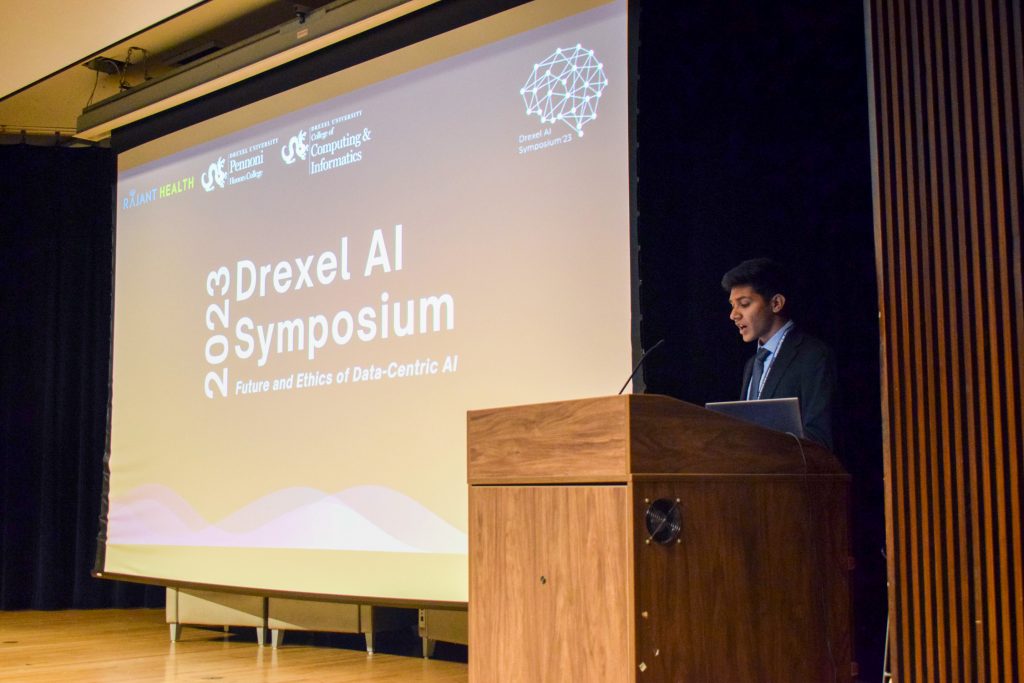
On Feb 25, Drexel University’s Society of Artificial Intelligence (AI) hosted a symposium in Nesbitt Auditorium where four professors and four researchers from various institutions commented on how AI is becoming more common in our society.
Arranged by the Society of AI vice president Satvik Tripathi, a second-year computer science major and the lead organizer of the AI symposium, the conversation focused on the applications of AI and how the speakers incorporate it into their various fields of study.
The event’s first half featured the four professors of AI-based college courses who each provided unique takes on AI’s benefits and the ways we can evolve and simplify the field of artificial intelligence. Dr. Edward Kim, an associate professor at Drexel, spoke first about his research on neuro-justified machine learning. The next speaker was Dr. Chris Callison-Burch, an associate professor at the University of Pennsylvania’s Department of Computer and Information Science exploring Chat GPT’s capabilities. Following them were Dr. Eric Eaton, a research associate professor in UPenn’s Department of Computer and Information Science researching new machine learning applications and Karl Schmeckpeper, a Ph.D. student at UPenn creating technologies incorporating the intersections of robotics, computer vision and machine learning.
The four also had critical remarks on AI changing the job market. As Dr. Kim shared, he had heard of someone whose job is to summarize data and information by inputting it into Chat GPT.
According to Dr. Kim, “[AI is] definitely transforming the way people interact with each other and their jobs.”
Four medical researchers who study ways to use AI to augment medical-based practices built on this idea by presenting their research during the second half of the symposium. Dr. Rafe McBeth, a medical physicist and UPenn assistant professor, presented first on exploring the use of AI to determine the best course of radiation-based cancer treatments. The second presentation was by Dr. Birkan Tunç, a computational scientist at the Center for Autism Research of the Children’s Hospital of Philadelphia, who is creating AI-based screening technology to detect signs of autism. The third presentation was given by Ameena Elahi, the Application Manager of the Medical Imaging Management Team for Penn Medicine’s Information Services Department, who is developing new AI-based clinical imaging applications. The fourth and final presenter was Dr. Hualou Liang, a Drexel University biomedical engineering professor researching AI to screen for early signs of neurological-based diseases like Alzheimer’s.
All four share the same principle of having their research methods approved by medical professionals to avoid ethical or philosophical disagreements. When doing research, Dr. Mcbeth “signs on a [AI-generated] chart, and a physician signs off on a chart validating it in that case.”
None of them could have shared their insights at the symposium without the ambition of the Society of AI’s e-board members to provide a broader perspective on AI’s capabilities for the students at Drexel University.
According to Suhani Dheer, a second-year psychology major and the Society of AI’s event coordinator, “[The AI Symposium] stands to promote the AI community in University City because we do not have a lot of AI-centric labs or organizations on campus that focus so much on it.”
The e-board members have unique takes on AI’s potential.
“Data science is a thing that has always existed and only has been getting bigger,” says Ritvik Sukumaran, a second-year data science major and the Society of AI’s community chair.
These dedicated students also have interesting perspectives on their passion for being familiar with AI as it becomes more frequent in our society.
For Sanjna Srinivasan, a first-year biomedical engineering major and Society of AI organizational committee member, “It’s eye-opening for students to learn about what you can do with research.”
The Society of AI members took it upon themselves to educate others about the growth of AI in fields of study besides technology with the help of a few other unique minds inside and outside of Drexel by holding the AI symposium. With the members’ admiration for AI’s presence in this rapidly changing world, the Society of AI is flying high to accomplish the mission of promoting the power of AI and machine learning at Drexel.

